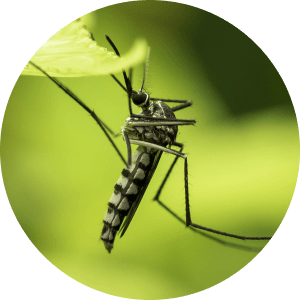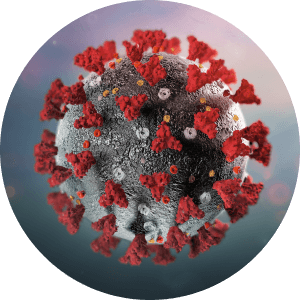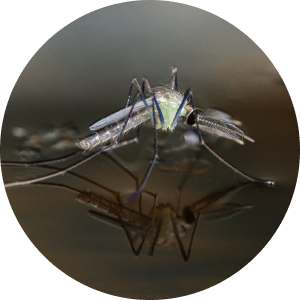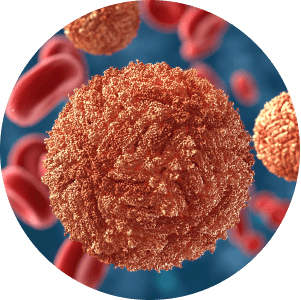Emerging & Re-emerging Disease Vaccines
vaccines
Diseases caused by newly emergent viruses, such as HIV, Ebola, SARS, MERS and SARS2-CoV, can result from increased contact with animals, often due to the expansion of the human habitat, and can lead to epidemics and pandemics. New vaccines that can be developed and deployed rapidly and reliability are a critical first line of defense against emerging and re-emerging disease outbreaks.
West Nile Virus
Coronavirus
Chikungunya Virus
Zika Virus
West Nile Virus
Virtually unknown in the U.S. prior to 1999, the West Nile virus is now prevalent throughout the U.S. and Canada. While the majority of human infections result in mild to no symptoms, more severe forms of the disease can result in long term neuropathological effects and even fatalities. In mild cases flu-like symptoms are common. However, persistent encephalitis, meningitis, and polio-like symptoms are seen in more severe cases.

Unlike many human viral diseases, West Nile causes both disease and death in animals. A well-validated animal model of human West Nile disease has been developed. We have conducted several studies using various formulations of Hawaii Biotech’s West Nile vaccine in this model. The results have shown that the vaccine provided 100% protection (all animals survived and remained healthy), while 50-75% of the control animals (animals not given vaccine) died or were sick. We maintain an IND on our recombinant subunit vaccine and have completed Phase 1 human clinical studies. This WNV vaccine was well tolerated at all doses tested and induced strong neutralizing antibody titers in these Phase 1 studies.
Coronavirus
In the last 18 years there have been 3 significant coronavirus outbreaks that have greatly impacted global health. First, there was the Severe Acute Respiratory Syndrome (SARS) in 2002, then the Middle East Respiratory Syndrome (MERS) in 2012, and most recently a novel coronavirus in 2019, now officially named SARS-CoV-2 and the disease it causes in referred to as COVID-19.

On March 11, 2020, as a result of the rapid global spread of the virus, the WHO declared that COVID-19 had reached pandemic levels. The emergence of the novel SARS-CoV-2 variants have necessitated the need to develop effective medical counter measures to effectively respond to the public health threat posed by this mutating virus.
In the development of coronavirus vaccines, it is important to carefully evaluate vaccine candidates in terms of safety as prior studies have identified concerns of enhanced disease as a result of skewed antibody responses that result in inflammatory alveolar damage. Our studies are designed to address these concerns through the design of subunits and the use of adjuvants that engender balanced Th1/Th2, or Th1 biased responses. The current recombinant subunit approach provides a means to deliver a safe, stable, and established manufacturing platform for a SARS CoV-2 vaccine.
The company is pursuing multiple coronavirus vaccine opportunities, including an individual monovalent Covid-19 vaccine candidate, a prime-boost approach with other vaccines to increase durability, a thermal-stable candidate, and a multivalent Coronavirus candidate.
Chikungunya Virus
Chikungunya virus (CHIKV) causes fever, rash, and arthralgia in humans, leading to debilitating illness and a low quality of life. In the past decade, CHIKV outbreaks have spread beyond the endemic regions of Africa and Asia. The World Health Organization reported in 2014 that there were over 1 million suspected cases of Chikungunya in the Caribbean islands and Central and South American countries.

While the number of cases has declined since this peak in 2014, the geographic expansion of CHIKV has continued with the most recent outbreak occurring in Pakistan in 2016. Estimates indicate that 1.3 billion people reside in areas at-risk for CHIKV transmission. As a result of this increase in range and number of human cases, CHIKV is considered a re-emerging pathogen; a contributing factor to this re-emergence is the adaptation to transmission by Aedes albopictus mosquitoes. Currently, there are no licensed vaccines or therapeutics to protect against CHIKV infection.
As with many emerging viral infections, supportive care is the only available treatment. Given the severe morbidity caused by CHIKV, its swift emergence, and continued expansion, a preventative vaccine is necessary to reduce the disease burden. We have developed a promising recombinant subunit CHIKV vaccine that induces high levels of neutralizing antibodies and prevents viral replication in immune competent mice. As with all vaccines, and in particular for priority pathogens such as CHIKV which requires BSL-3 handling, a combination of safety and economics in manufacturing are of paramount importance. Our recombinant subunit approach provides a means to deliver a safe, stable, and established manufacturing platform for a CHIKV vaccine.
Zika Virus
Zika virus (ZIKV) is a mosquito-borne flavivirus that was originally isolated in 1947, and since that time has, caused sporadic outbreaks of mild disease in Africa, and Asia. Historically, symptoms associated with ZIKV infection were mild and so, until recently, the virus was not considered a significant public health issue.

However, beginning with an outbreak in French Polynesia in 2013, infection with ZIKV has been associated with more severe neurological symptoms and birth defects. These more severe symptoms coupled with a dramatic spread of the virus throughout South and Central America, has led to a declaration of ZIKV as a public health emergency by the World Health Organization (WHO). There is currently no approved vaccine or specific anti-viral intervention for ZIKV. Multiple vaccine candidates have been discussed; all are in preclinical development. The development of a safe and effective vaccine for ZIKV is of paramount importance.
The goal of Hawaii Biotech’s develop program is to optimize a ZIKV recombinant subunit vaccine candidate for rapid and durable immune responses. To achieve this goal, the Company has combined our recombinant protein vaccine platform with clinical stage adjuvant formulations containing the synthetic TLR-4 agonist. Hawaii Biotech has optimized a bioactive vaccine candidate including antigen and TLR-4 agonist at efficacious concentration in murine immunogenicity studies. Hawaii Biotech has verified the protective efficacy of lead vaccine candidates in a ZIKV animal challenge models. We have identified an effective ZIKV vaccine candidate and look forward to finalizing toxicology studies, manufacturing, and initiate clinical testing.
West Nile Virus
West Nile Virus
Virtually unknown in the U.S. prior to 1999, the West Nile virus is now prevalent throughout the U.S. and Canada. While the majority of human infections result in mild to no symptoms, more severe forms of the disease can result in long term neuropathological effects and even fatalities. In mild cases flu-like symptoms are common. However, persistent encephalitis, meningitis, and polio-like symptoms are seen in more severe cases.

Unlike many human viral diseases, West Nile causes both disease and death in animals. A well-validated animal model of human West Nile disease has been developed. We have conducted several studies using various formulations of Hawaii Biotech’s West Nile vaccine in this model. The results have shown that the vaccine provided 100% protection (all animals survived and remained healthy), while 50-75% of the control animals (animals not given vaccine) died or were sick. We maintain an IND on our recombinant subunit vaccine and have completed Phase 1 human clinical studies. This WNV vaccine was well tolerated at all doses tested and induced strong neutralizing antibody titers in these Phase 1 studies.
Coronavirus
Coronavirus
In the last 18 years there have been 3 significant coronavirus outbreaks that have greatly impacted global health. First, there was the Severe Acute Respiratory Syndrome (SARS) in 2002, then the Middle East Respiratory Syndrome (MERS) in 2012, and most recently a novel coronavirus in 2019, now officially named SARS-CoV-2 and the disease it causes in referred to as COVID-19.

On March 11, 2020, as a result of the rapid global spread of the virus, the WHO declared that COVID-19 had reached pandemic levels. The emergence of the novel SARS-CoV-2 variants have necessitated the need to develop effective medical counter measures to effectively respond to the public health threat posed by this mutating virus.
In the development of coronavirus vaccines, it is important to carefully evaluate vaccine candidates in terms of safety as prior studies have identified concerns of enhanced disease as a result of skewed antibody responses that result in inflammatory alveolar damage. Our studies are designed to address these concerns through the design of subunits and the use of adjuvants that engender balanced Th1/Th2, or Th1 biased responses. The current recombinant subunit approach provides a means to deliver a safe, stable, and established manufacturing platform for a SARS CoV-2 vaccine.
The company is pursuing multiple coronavirus vaccine opportunities, including an individual monovalent Covid-19 vaccine candidate, a prime-boost approach with other vaccines to increase durability, a thermal-stable candidate, and a multivalent Coronavirus candidate.
Chikungunya Virus
Chikungunya Virus
Chikungunya virus (CHIKV) causes fever, rash, and arthralgia in humans, leading to debilitating illness and a low quality of life. In the past decade, CHIKV outbreaks have spread beyond the endemic regions of Africa and Asia. The World Health Organization reported in 2014 that there were over 1 million suspected cases of Chikungunya in the Caribbean islands and Central and South American countries.

While the number of cases has declined since this peak in 2014, the geographic expansion of CHIKV has continued with the most recent outbreak occurring in Pakistan in 2016. Estimates indicate that 1.3 billion people reside in areas at-risk for CHIKV transmission. As a result of this increase in range and number of human cases, CHIKV is considered a re-emerging pathogen; a contributing factor to this re-emergence is the adaptation to transmission by Aedes albopictus mosquitoes. Currently, there are no licensed vaccines or therapeutics to protect against CHIKV infection.
As with many emerging viral infections, supportive care is the only available treatment. Given the severe morbidity caused by CHIKV, its swift emergence, and continued expansion, a preventative vaccine is necessary to reduce the disease burden. We have developed a promising recombinant subunit CHIKV vaccine that induces high levels of neutralizing antibodies and prevents viral replication in immune competent mice. As with all vaccines, and in particular for priority pathogens such as CHIKV which requires BSL-3 handling, a combination of safety and economics in manufacturing are of paramount importance. Our recombinant subunit approach provides a means to deliver a safe, stable, and established manufacturing platform for a CHIKV vaccine.
Zika Virus
Zika Virus
Zika virus (ZIKV) is a mosquito-borne flavivirus that was originally isolated in 1947, and since that time has, caused sporadic outbreaks of mild disease in Africa, and Asia. Historically, symptoms associated with ZIKV infection were mild and so, until recently, the virus was not considered a significant public health issue.

However, beginning with an outbreak in French Polynesia in 2013, infection with ZIKV has been associated with more severe neurological symptoms and birth defects. These more severe symptoms coupled with a dramatic spread of the virus throughout South and Central America, has led to a declaration of ZIKV as a public health emergency by the World Health Organization (WHO). There is currently no approved vaccine or specific anti-viral intervention for ZIKV. Multiple vaccine candidates have been discussed; all are in preclinical development. The development of a safe and effective vaccine for ZIKV is of paramount importance.
The goal of Hawaii Biotech’s develop program is to optimize a ZIKV recombinant subunit vaccine candidate for rapid and durable immune responses. To achieve this goal, the Company has combined our recombinant protein vaccine platform with clinical stage adjuvant formulations containing the synthetic TLR-4 agonist. Hawaii Biotech has optimized a bioactive vaccine candidate including antigen and TLR-4 agonist at efficacious concentration in murine immunogenicity studies. Hawaii Biotech has verified the protective efficacy of lead vaccine candidates in a ZIKV animal challenge models. We have identified an effective ZIKV vaccine candidate and look forward to finalizing toxicology studies, manufacturing, and initiate clinical testing.

